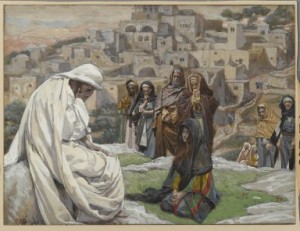 Dear Father John, I pray quite a bit…mostly because I have had some suffering in my life that has drained me, even spiritually. I pray for many things, but mostly, I pray for my own faith. One day, as I was praying, I said to Christ, “I feel like I’m alone in my suffering, yet I am asked to reflect and meditate on Your suffering.” After I prayed and asked that question, I had a sort of internal answer to it. I heard, or felt Christ say to me, “I suffer when you suffer. Why wouldn’t I? We’re in this together. We are one body.” I thought about that and, actually couldn’t believe that Christ suffers with me. The question is, was that internal answer correct? I had never thought in all my life that Christ suffers with me, so it came as a shock. Then, I looked it up on the Internet and found out that, while we are asked to suffer for Christ, He also feels our suffering and actually feels bad for us. That notion has helped me a great deal, because I feel more connected to Christ as being a real person with real feelings.
Dear Father John, I pray quite a bit…mostly because I have had some suffering in my life that has drained me, even spiritually. I pray for many things, but mostly, I pray for my own faith. One day, as I was praying, I said to Christ, “I feel like I’m alone in my suffering, yet I am asked to reflect and meditate on Your suffering.” After I prayed and asked that question, I had a sort of internal answer to it. I heard, or felt Christ say to me, “I suffer when you suffer. Why wouldn’t I? We’re in this together. We are one body.” I thought about that and, actually couldn’t believe that Christ suffers with me. The question is, was that internal answer correct? I had never thought in all my life that Christ suffers with me, so it came as a shock. Then, I looked it up on the Internet and found out that, while we are asked to suffer for Christ, He also feels our suffering and actually feels bad for us. That notion has helped me a great deal, because I feel more connected to Christ as being a real person with real feelings.
Well, you have answered your own question, and you have answered correctly. Yes, Jesus suffers with us. Jesus, the second Person of the Blessed Trinity, truly became man not only so that he could atone for our disobedience (i.e., our sin) by his obedience, but also because he wanted to convince us of his unconditional love for us. Try to think of a better way to show someone that you love them than by sharing in their suffering. Just try to… impossible. Our commitment to another person is partial and conditional if we refuse to share in their sufferings, if we abandon them in difficulty. But God’s commitment to us is total, absolute, wildly and infinitely faithful. It’s hard for us to believe this. That’s why he chose to save us through suffering for us. By his suffering, he united himself to our suffering, voluntarily. And so, in a tour de force of ingenuity, suffering, the fruit of original sin, has become the very currency of salvation, the very path of deeper union with God.
An Uncanny Connection
Jesus suffers with us, because he has united himself to us. This occurs in two ways.
Simply because of his incarnation, he has taken upon himself human nature. And so, every human being is his brother or sister. This is why he told us that “in so far as you did this to one of the least of these brothers of mine, you did it to me” (Matthew 25:40). An even deeper union with Christ occurs at baptism. When we receive sanctifying grace through that sacrament, the Holy Trinity actually comes to dwell within us: “If anyone loves me he will keep my word, and my Father will love him, and we shall come to him and make our home with him” (John 14:24).
This is actually the deeper meaning of the word “compassion.” It comes from a Latin phrase meaning “to suffer with.” Jesus, by taking on our nature and uniting himself to us, has shown a brand of compassion that no other religion ever even dreamed of. This is why the cross is the central symbol of Christianity. The vertical and horizontal bars meet and become inextricably linked, just as our suffering and Christ’s suffering meet and become, together, the path of redemption. Suffering entered the world because of sin – it was our own fault. Jesus came to save us not by eliminating suffering (which would have eliminated our freedom), but by transforming suffering, making it the privileged meeting place between fallen man and the God of all-powerful love. You have already experienced this – you mentioned that you are someone who prays, because your own sufferings have brought you to your knees. That’s how you discovered that you are never alone.
Being Like Christ
This truth is also at the root of Christian virtue. We are all called to love our neighbors as Christ has loved us – coming to meet them in their suffering, being compassionate and merciful with them, not giving up on them, not letting them suffer alone. Wasn’t this the genius of Blessed Mother Teresa of Calcutta? Isn’t it precisely this message of divine compassion that she and her sisters (and all the saints, really) broadcast to the world?
Once Mother Teresa was staying with a community of her sisters who worked among the Aborigines in Australia. She visited an elderly man who lived in total isolation, ignored by everyone. His home was a filthy wreck. She told him, “Please let me clean your house, wash your clothes and make your bed.” He answered, “I’m OK like this. Let it be.” She said, “You will be still better if you allow me to do it.” He finally agreed. While she was cleaning, she discovered a beautiful lamp, covered with dust; it looked like it hadn’t been used in years. “Don’t you light that lamp?” she said, “Don’t you ever use it?” He answered, “No. No one comes to see me. I have no need to light it. Who would I do it for?” Mother Teresa asked, “Would you light it every night if the sisters came?” He replied, “Of course.” From that day on, the sisters committed themselves to visiting him every evening. Mother Theresa left Australia. Two years passed. She had completely forgotten about that encounter. Then she received a message from him: “Tell my friend that the light she lit in my life still continues to shine.”
Revolutionary Doctrine
This is the revolution of Christianity: that every single human life is infinitely valued by God, valued so much that God himself accompanies each one, in good times and bad, and desires us all to dwell with him forever in heaven. It is this truth that gives the Church its vision of human dignity and undergirds its moral teaching on issues like cloning, abortion, and artificial reproduction. Only the Christian worldview contains this insight, which God has so beautifully and graciously whispered to your heart.
And just to make sure that we would never doubt this reality, never think that it’s too good to be true, Jesus gave us the Eucharist. When he comes to us in Holy Communion, whether amidst the joys of life’s triumphs or the sorrows of life’s tragedies, he is telling us once again: You matter so much to me that I can’t hold myself back; I must share in all that you suffer, so that you can share in all that I promise.
Yours in Christ, Father John Bartunek, LC


